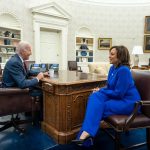Donald Trump recently unveiled a bold plan aimed at revitalizing the American auto industry, delivering his vision to a rapt audience at the Detroit Economic Club. As if stepping back into his reality TV show, Trump positioned himself as the definitive savior of Michigan’s automotive sector. His proposed measures, including making interest on car loans tax-deductible, seem calibrated to send shockwaves through the industry—not to mention the ever-growing thrill of applause from those eager to hop back on the Trump train.
During his speech, Trump promised that his return to the White House would herald an era where the auto industry would become “bigger and more important than it ever was.” Such assurances are music to the ears of car manufacturers, while small businesses in the sector may perk up at the prospect of expanded tax deductions for work vehicles. Trump, the tax-cut maestro, aims to revolutionize car loans and fuel the industry with his pro-growth policies, although one cannot help but wonder if he keeps a magic wand tucked away for luck.
We will make interest on car loans FULLY deductible , TRUMP delivers remarks on TAXES CUTS at Detroit Economic club today 🦅🇺🇸❤️.https://t.co/JQ3enrFhTw. https://t.co/hvXrONzf5q
— cmarin (@cmir_r) October 10, 2024
Not one to shy away from the competition, Trump also intends to revamp the United States-Mexico-Canada trade agreement, signaling that the negotiations under his reign would ensure that foreign competitors, especially China, wouldn’t be getting a free pass. He aims to impose strong protective measures against “trans-shipments”—essentially cutting off any sneaky attempts by other countries to bypass U.S. tariffs. If that doesn’t sound like a master negotiator ready to flex some muscle, what does?
His plan doesn’t stop there, as controlled tariffs are part of his grand design to bolster the domestic auto industry. Trump made a playful jab at the negative connotations of the term “tariff,” suggesting it deserves a PR overhaul. According to him, those who see tariffs as detrimental must simply not understand their beautiful implications—as if saying “tariff” out loud will magically revive manufacturing jobs.
Despite facing skepticism from the Biden administration, Trump and his camp remain undeterred. The opposition, including Vice President Kamala Harris, has questioned the feasibility of Trump’s promises, bringing up past auto industry management that resulted in an overall reduction in jobs. However, where some see a backward glance, Trump sees opportunity—a chance to flip the narrative and promise a manufacturing resurrection.
As he rallied support, Trump painted a picture of an automotive renaissance unlike anything seen in history, suggesting that just one vote could reverse the exodus of jobs that once flowed south to Mexico and east to China. For those who remember the golden days of American automotive dominance, this might sound like a spellbinding revival song, one that plays to the heartstrings of every Michigander hoping to see their industry thrive once more.




